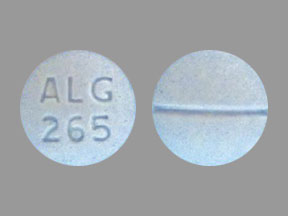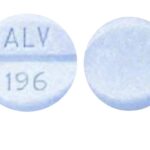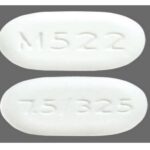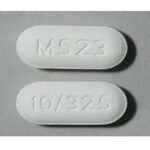ALG 265 Pill: Uses, Dosage, Side Effects, Addiction

The ALG 265 blue round pill is a brand of Oxycodone Hydrochloride 30 mg supplied by Alvogen, Inc.. ALG 265 pill is used to relieve pain severe enough to require opioid treatment and when other pain medicines did not work well enough or cannot be tolerated. It belongs to the group of medicines called narcotic analgesics (pain medicines). Oxycodone acts on the central nervous system (CNS) to relieve pain.
When ALG 265 pill is used for a long time, it may become habit-forming, causing mental or physical dependence. However, people who have continuing pain should not let the fear of dependence keep them from using narcotics to relieve their pain. Mental dependence (addiction) is not likely to occur when narcotics are used for this purpose. Physical dependence may lead to withdrawal side effects if treatment is stopped suddenly. However, severe withdrawal side effects can usually be prevented by gradually reducing the dose over a period of time before treatment is stopped completely.
How should ALG 265 pill be used?
ALG 265 pills are taken usually with or without food every 4 to 6 hours, either as needed for pain or as regularly scheduled medications. Follow the directions on your prescription label carefully, and ask your doctor or pharmacist to explain any part you do not understand. Take oxycodone exactly as directed.
Your doctor will likely start you on a low dose of ALG 265 pill and may increase this dose over time if your pain is not controlled. After you take oxycodone for a period of time, your body may become used to the medication. If this happens, your doctor may need to increase your dose to control your pain. Your doctor may decrease your dose if you experience side effects. Talk to your doctor about how you are feeling during your treatment with oxycodone.
What are the side effects of ALG 265 pills?
ALG 265 pills may cause side effects. Tell your doctor if any of these symptoms, are severe or do not go away:
- dry mouth
- stomach pain
- drowsiness
- flushing
- headache
- mood changes
Some side effects can be serious. If you experience any of these symptoms, call your doctor immediately or get emergency medical help:
- changes in heartbeat
- agitation, hallucinations (seeing things or hearing voices that do not exist), fever, sweating, confusion, fast heartbeat, shivering, severe muscle stiffness or twitching, loss of coordination, nausea, vomiting, or diarrhea
- nausea, vomiting, loss of appetite, weakness, or dizziness
- inability to get or keep an erection
- irregular menstruation
- decreased sexual desire
- chest pain
- hives
- itching
- rash
- swelling of the face, throat, tongue, lips, eyes, hands, feet, ankles, or lower legs
- hoarseness
- difficulty breathing or swallowing
- seizures
- extreme drowsiness
- lightheadedness when changing positions
If you experience a serious side effect, you or your doctor may send a report to the Food and Drug Administration’s (FDA) MedWatch Adverse Event Reporting program online (http://www.fda.gov/Safety/MedWatch) or by phone (1-800-332-1088).
Oxycodone may cause other side effects. Call your doctor if you have any unusual problems while you are taking this medication.
ALG 265 pills Safety Information
It is very important that your doctor check your progress while you are using this medicine, especially within the first 24 to 72 hours of treatment. This will allow your doctor to see if the medicine is working properly and to decide if you should continue to take it. Blood and urine tests may be needed to check for unwanted effects.
Do not use this medicine if you are using or have used an MAO inhibitor (MAOI) (eg, isocarboxazid [Marplan®], linezolid [Zyvox®], phenelzine [Nardil®], selegiline [Eldepryl®], tranylcypromine [Parnate®]) within the past 14 days.
This medicine may cause a serious type of allergic reaction called anaphylaxis, which can be life-threatening and requires immediate medical attention. Call your doctor right away if you have a rash, itching, hoarseness, trouble breathing or swallowing, or any swelling of your hands, face, or mouth while you are using this medicine.
It is against the law and dangerous for anyone else to use your medicine. Keep your unused medicine in a safe and secure place. People who are addicted to drugs might want to steal this medicine.
If you think you or someone else may have taken an overdose of this medicine, get emergency help at once. Your doctor may also give naloxone to treat an overdose. Signs of an overdose include: change or loss of consciousness, cold, clammy skin, coughing that sometimes produces a pink frothy sputum, decreased awareness or responsiveness, extreme dizziness or weakness, increased sweating, irregular, fast, or slow, or shallow breathing, pale or blue lips, fingernails, or skin, sleepiness or unusual drowsiness, slow heartbeat, seizures, swelling in legs and ankles, or trouble breathing. Call your doctor right away if you notice these symptoms.
This medicine may cause sleep-related breathing problems (eg, sleep apnea, sleep-related hypoxemia). Your doctor may decrease your dose if you have sleep apnea (stop breathing for short periods during sleep) while using this medicine.
This medicine will add to the effects of alcohol and other CNS depressants. Some examples of CNS depressants are antihistamines or medicine for allergies or colds, sedatives, tranquilizers, or sleeping medicine, other prescription pain medicine or narcotics, medicine for seizures or barbiturates, muscle relaxants, or anesthetics (numbing medicines), including some dental anesthetics. This effect may last for a few days after you stop using this medicine. Check with your doctor before taking any of these medicines while you are using this medicine.
This medicine may be habit-forming. If you feel that the medicine is not working as well, do not use more than your prescribed dose. Call your doctor for instructions.
Dizziness, lightheadedness, or fainting may occur when you get up suddenly from a lying or sitting position. Getting up slowly may help lessen this problem. Also, lying down for a while may relieve dizziness or lightheadedness.
This medicine may make you dizzy, drowsy, or lightheaded. Do not drive or do anything else that could be dangerous until you know how this medicine affects you.
Using narcotics for a long time can cause severe constipation. To prevent this, your doctor may direct you to take laxatives, drink a lot of fluids, or increase the amount of fiber in your diet. Be sure to follow the directions carefully, because continuing constipation can lead to more serious problems.
If you have been using this medicine regularly for several weeks or longer, do not change your dose or suddenly stop using it without checking with your doctor. Your doctor may want you to gradually reduce the amount you are using before stopping it completely. This may help prevent worsening of your condition and reduce the possibility of withdrawal symptoms, such as stomach cramps, anxiety, fever, nausea, restlessness, runny nose, sweating, tremors, or trouble sleeping.
Using this medicine while you are pregnant may cause serious unwanted effects, including neonatal withdrawal syndrome in your newborn baby. Tell your doctor right away if you think you are pregnant or if you plan to become pregnant while using this medicine.
For nursing mothers taking this medicine:
- Talk to your doctor if you have any questions about taking oxycodone or about how this medicine may affect your baby.
- Call your doctor if you become extremely tired and have difficulty caring for your baby.
- Your baby should generally nurse every 2 to 3 hours and should not sleep for more than 4 hours at a time.
- Check with your doctor or hospital emergency room immediately if your baby shows signs of increased sleepiness (more than usual), difficulty breastfeeding, difficulty breathing, or limpness. These may be symptoms of an overdose and need immediate medical attention.
Using too much of this medicine may cause infertility (unable to have children). Talk with your doctor before using this medicine if you plan to have children.
This medicine may cause adrenal gland problems. Check with your doctor right away if you have darkening of the skin, diarrhea, dizziness, fainting, loss of appetite, mental depression, nausea, skin rash, unusual tiredness or weakness, or vomiting.
Check with your doctor right away if you have anxiety, restlessness, a fast heartbeat, fever, sweating, muscle spasms, twitching, nausea, vomiting, diarrhea, or see or hear things that are not there. These may be symptoms of a serious condition called serotonin syndrome. Your risk may be higher if you also take certain other medicines that affect serotonin levels in your body.
Make sure any doctor or dentist who treats you knows that you are using this medicine. This medicine may affect the results of certain medical tests.
Do not take other medicines unless they have been discussed with your doctor. This includes prescription or nonprescription (over-the-counter [OTC]) medicines and herbal or vitamin supplements.





